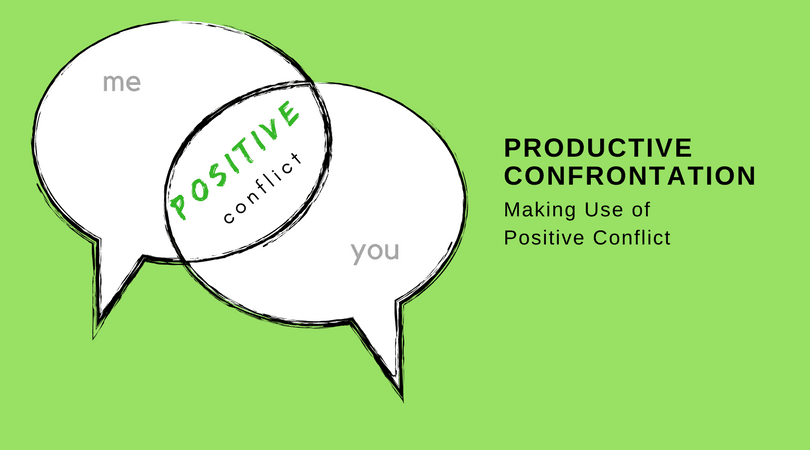Is it Possible to Have Productive Confrontation?

 Conflict isn’t good or bad, it simply happens when two or more people see the world differently.
Conflict isn’t good or bad, it simply happens when two or more people see the world differently.
Thriving individuals and organizations learn how to transform conflict into learning, innovation and improvement by leveraging the value of diverse thinking, and a common interest towards a better future.
Productive Confrontation is way to confront colleagues that demonstrates a caring approach by bringing to their attention a different perspective, interpretation, or unintended impact. In addition to facing an issue in the workplace, positive confrontation has many benefits to team culture including increasing trust, collaboration, innovation, and quality of work products.
Basic Steps to Productive Confrontation
- Start from the perspective of mutual benefit. Starting from a place of appreciation for the other person helps us frame the issue we wish to discuss in a way that will create support for that individual. It takes courage and effort to provide valuable feedback, and it is more likely to be well received when it is delivered in a caring fashion. Being the first person in a group willing to face issues and act on them in the interest of all involved demonstrates leadership. You may find yourself stepping up as a leader when you have an opportunity to help others make a change for the better.
- Consider what is most important to convey. Identify your needs, and the needs of the situation. Is this something you can let go, or something that needs to be addressed? Can you address it in the spirit of mutual benefit? Sometimes we need time to gather our thoughts so we can figure out how to remove strong emotions or triggers from the communication in order to focus on what is most important.
- Ask permission. Feedback offered after a request for permission has been made helps both parties be ready. Permission may sound like: May I share an observation? or May I offer a suggestion for improvement? or I have some feedback that I’d like to share to help us both. Would that be OK?
- Share without sting. When participants are open to receiving feedback, deliver it in a neutral tone as your observation of behavior without blame, shame or anger. Focus on what you want to see happen going forward. Use only the amount of intensity needed to get the job done. Try not to criticize the person, defend your needs, or get defensive based on their response. Detailing annoyances, slights, hurts, etc. as justification will probably not move the situation forward. Your openness helps set a neutral, learning tone to the communication. Observe, request, reflect, or suggest. Asking a question can be a powerful form of caring confrontation. For instance, “Can we take a moment to appreciate the work that went into this document before discussing how it needs to be improved?
- Listen well. Listen to what the other person is communicating in response to your caring confrontation, including what is important to them, and any relevant facts that you may not have been aware of previously. Get curious and dig deeper about their thought process if there is something you don’t understand. An example question may be: “What leads you to that conclusion?” What information or experiences contributed to their perspective? Your goal is to have a holistic and compassionate view of their perspective on the situation.
- “Feed forward” for closure. Conclude the conversation with a solution that addresses both/all people’s concerns. Outline how to work better together in the future. Obtain agreements as needed, to ensure clarity about what will happen next time, and how the situation or relationship can be positively impacted going forward.
Confrontation becomes productive confrontation when we speak the truth in love, expressing our deepest needs and beliefs while respecting the deepest beliefs and needs of others, holding self and others accountable out of mutual respect, and for the ultimate benefit of the group’s mission. We are all better off if we can learn from one another. Productive confrontation brings that learning into a real time development opportunity for both parties.
Think of a tough conversation you had in the past year, or a sticky situation you know you’ll need to discuss soon. Tell us in the comments: how did you or will you lead the discussion to a place of mutual benefit?
0 Comments